
1 – George Washington (1789-1797)
Growing up in Virginia, George Washington tragically lost his father at 11 years old. As a young man, he had two horses shot out from under him but was declared a hero during the French and American War. He went on to lead the Continental Army to victory over the British forces, securing the freedom of the thirteen colonies. After that, George Washington became the first and only President elected unanimously to that position for a salary of $25,000 which he refused to accept. He made the shortest inauguration speech ever—just 133 words spoken in less than two minutes. His administration created the President’s cabinet, added the first ten amendments to the Constitution called the Bill of Rights, and established the Supreme Court.
By the end of his second term, Washington was exhausted and frustrated. His decision to retire unintentionally set a two-term precedent, later reaffirmed by Thomas Jefferson, that would not be broken until Franklin D. Roosevelt sought and won a 3rd term in 1940.
“I walk on untrodden ground. There is scarcely any part of my conduct which may not hereafter be drawn into precedent.”

2- John Adams (1797-1801)
John Adams served as our country’s first Vice President. Born in Massachusetts, he was the only non-Virginian among the first five presidents and the only one who did not own slaves. Prior to being elected as President, he had spent much time overseas, honing his skills in foreign affairs. John Adams was the first President to reside in the White House. He and his wife Abigail moved into the unfinished structure in 1800, which they found cold and drafty, and lived there for four months until his term ended. Adams’ administration saw the creation of the Navy Department, the buildup of the army and the navy, and the creation of the United States Marine Band. Adams had a contentious relationship with his Vice-President and successor, Thomas Jefferson. Even though Adams had lost the election to Jefferson, he appointed a new Supreme Court Justice just before leaving office.
“Facts are stubborn things; and whatever may be our wishes, our inclinations, or the dictates of our passions, they cannot alter the
state of facts and evidence.”

3 – Thomas Jefferson (1801-1809)
Thomas Jefferson received a wonderful education. When the Second Continental Congress met, they chose Jefferson to compose the Declaration of Independence because of his exquisite writing skills. Prior to his presidency, Jefferson served as Secretary of State under Washington and as Vice President for Adams. Jefferson became the first President to be inaugurated in Washington D.C. During his administration, Jefferson initiated the Louisiana Purchase from France for $15 million, doubling the size of the United States. He sent the Lewis and Clark expedition to map and explore this new territory. Some of Jefferson’s actions with respect to England and trade led to the War of 1812. Jefferson was an architect who designed many of the buildings in Washington D.C., an archeologist with a passion for fossils, and a book aficionado whose collection replaced those in the Library of Congress raided by the British in 1814. Ironically, both Adams and Jefferson died on the same day—July 4, 1826.
“I cannot live without books.”
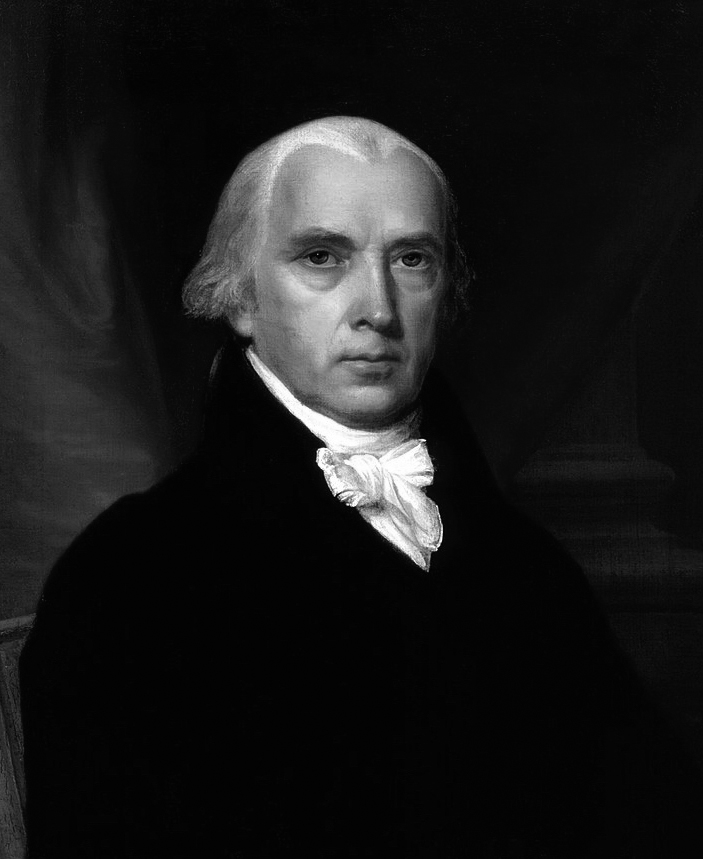
4 – James Madison (1809-1817).
James Madison started out studying law but ended up becoming a statesman. His work on the U.S. Constitution led to his nickname, the “Father of the Constitution.” Before becoming President, he helped push through the Bill of Rights and served as Thomas Jefferson’s secretary of state. Unfortunately, Madison inherited Jefferson’s trade policies and the resultant War of 1812 dominated his presidency and led to the burning down of the original White House. His wife, Dolley, enjoyed the role of hostess and helped define that role for first ladies who would follow. Our smallest president, Madison stood 5 feet 4 inches tall and weighed in at 100 pounds.
“Knowledge will forever govern ignorance, and a people who mean to be their own governors, must arm themselves with the power knowledge gives. A popular government without popular information or the means of acquiring it, is but a prologue to a farce or a tragedy or perhaps both”
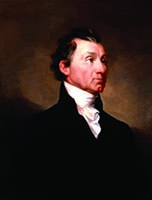
5 – James Monroe (1817-1825)
James Monroe almost died from a bullet wound to the shoulder during the Revolutionary War. A protégé of Jefferson and Madison, Monroe held many positions in his distinguished career including senator, governor of Virginia, various foreign diplomatic posts, Secretary of State, and Secretary of War. He is the only person who served in two cabinet posts simultaneously! In 1823, he released the first U.S. foreign policy statement called the Monroe Doctrine which stated that the Western Hemisphere was no longer open to colonization or aggression by foreign governments. In 1820, Monroe signed the Missouri Compromise extending slavery into the territories while maintaining a balance between slave and free states and paving the road to the Civil War.
“Our country may be likened to a new house. We lack many things, but we possess the most precious of all – liberty!”

6 – John Quincy Adams (1825-1829)
The son of John Adams and deeply influenced by the American Revolution, John Quincy Adams grew up near Boston, Massachusetts. His early career included a stint in law, multiple foreign diplomatic positions, and service as Secretary of State where he played a key role in formulating the Monroe Doctrine. Believing in a strong federal government and possessing an earnest desire to improve the conditions of American society, he sought to build up canals, roads, and harbors in the young country.
While President, Adams liked to skinny-dip in the Potamic River where he was once cornered by a reporter who would not return his clothes until he got his interview.
After his presidency won by a narrow margin in 1824, Adams served in the U.S. House of Representatives for 9 terms. Adams also argued a case in favor of illegally abducted slaves before the Supreme Court.
“From the experience of the past we derive instructive lessons for the future.”
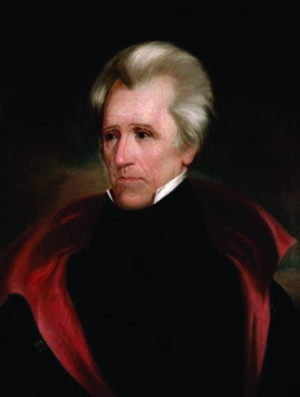
7 – Andrew Jackson (1829-1837)
The only President from South Carolina, Andrew Jackson fought in the Revolutionary War as a youth and lost much of family during this conflict. Prior to becoming President, he studied and practiced law in Tennessee, becoming that state’s first congressman, a U.S. Senator, and judge on its superior court. He achieved fame for his Indian battles as well as his role in defending New Orleans during the Battle of 1812. Jackson earned the name “Old Hickory” for his legendary toughness and engaged in some 100 duels during his lifetime. His presidency resulted in the Indian Removal Act which allowed for relocating and battling Indian tribes to free up land for westward expansion. Jackson is said to have vetoed 12 bills from Congress, a record at that time and he was the first president to experience an assassination attempt. Jackson died from lead poisoning due to a bullet lodged in his chest from one of his previous duels.
“As long as our government is administered for the good of the people, and is regulated by their will; as long as it secures to us the rights of persons and of property, liberty of conscience and of the press, it will be worth defending.”
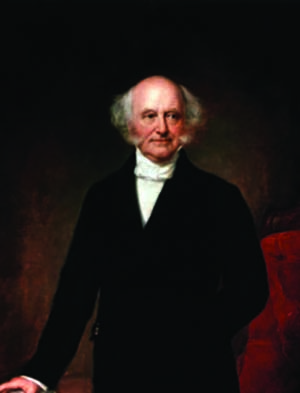
8 – Martin Van Buren (1837-1841)
The first U.S. President to be born in the United States, Martin Van Buren never lived a day under British rule. He originated in New York, where, as a youthful employee at his father’s tavern, he met many patriots like Aaron Burr and Alexander Hamilton. A lawyer, U.S. Senator, and New York governor, he served as Jackson’s Vice-President before succeeding him as president. The Panic of 1837, the worst financial crisis America had faced up to that point in its history, comprised his biggest challenge as president. That event confiscated many people’s life savings and probably resulted from Jackson’s banking policies. Van Buren decided that the government should play little role in its resolution. He continued Jackson’s precedent of forcibly relocating Indian tribes. Of note, Van Buren was a widower so his daughter-in-law, Angelica Singleton, served as White House hostess during his tenure.
“I tread in the footsteps of illustrious men… in receiving from the people the sacred trust confided to my illustrious predecessor.”

9 – William Henry Harrison (1841-1841)
Raised in an elite Virginian family, William Henry Harrison became known for his military career, waging wars against Indians, and serving in the War of 1812. Prior to his presidency, he negotiated unfair deals with the Indians, the most noteworthy leading to the Battle of Tippecanoe, later becoming part of his campaign slogan “Tippecanoe and Tyler Too.” His varied political positions included U.S. representative, senator, and foreign ambassador. President for only 30 days, Harrison contracted pneumonia after delivering a 2-hour inaugural address sans coat or hat on a cold, snowy day and became the first president to die in office. He strongly supported state rights and believed that each state should determine its own stance on the slavery issue.
“The attempt of those of one state to control the domestic institutions of another can only result in feelings of distrust and jealousy…and the ultimate destruction of our free institutions.”
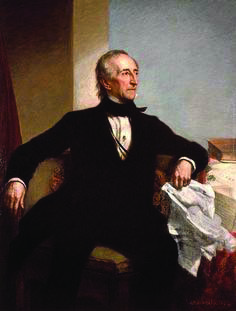
10 – John Tyler (1841-1845)
At 51, John Tyler became the first vice president to succeed a president who died in office and the youngest man to assume that position up to that point. At that time, the Constitution did not specify succession, so Tyler earned the nickname “His Accidency,” inherited Harrison’s cabinet, and lacked a vice president because there was no precedent for filling that position either. His previous career included military service in the War of 1812 as well as a stint in the U.S. House of Representatives and Senate. His views on slavery, similar to Harrison’s, made him popular with the southern states. When he vetoed a bill seeking to bring back the Bank of the U.S., his entire cabinet resigned. His first wife, Letitia Christian, died while he was president and he married Julia Gardner, becoming the first president to wed while in office. Tyler fathered 15 children, a presidential record. Before he left office, Tyler became the first President to experience his veto of a bill overturned by Congress.
“If the tide of defamation and abuse shall turn, and my administration come to be praised, future vice presidents who may succeed to the presidency may feel some slight encouragement to pursue
an independent course.”
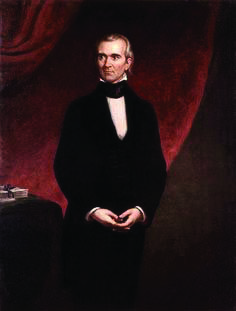
11 – James K. Polk (1845-1849)
James Polk, born in North Carolina, moved with his family to Tennessee while a child. He experienced much sickness in his early years. His career included service in the U.S. House of Representatives where he became speaker of the house and some time as governor of Tennessee. As president, he sought to expand the United States from coast to coast and created the Department of the Interior to administer these new lands. Acquisition of the Oregon Territory and the Mexican-American War which began in 1846 dominated his presidency. Texas finally became a recognized state during his tenure. As president, Polk became noted for his workaholic tendencies–keeping 12-hour days and only taking off 27 vacation days during his entire term. His legacy includes ideas like the Smithsonian Institute, the Naval Academy, and the U.S. Treasury. Three months after he left office, Polk passed away.
“No president who performs his duties faithfully and conscientiously can have any leisure”
Continue to Next Page

